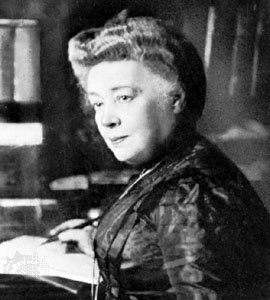Suttner, Bertha, Freifrau von
German author
in full Bertha Félicie Sophie, Freifrau von Suttner, née Gräfin (Countess) Kinsky von Wchinitz und Tettau, pseudonym Bertha Oulot
born June 9, 1843, Prague, Bohemia, Austrian Empire 【now in Czech Republic】
died June 21, 1914, Vienna
 Austrian novelist who was one of the first notable woman pacifists. She is credited with influencing Alfred Nobel in the establishment of the Nobel Prize for Peace, of which she was the recipient in 1905. Her major novel, Die Waffen nieder! (1889; Lay Down Your Arms!), has been compared in popularity and influence with Harriet Beecher Stowe's Uncle Tom's Cabin.
Austrian novelist who was one of the first notable woman pacifists. She is credited with influencing Alfred Nobel in the establishment of the Nobel Prize for Peace, of which she was the recipient in 1905. Her major novel, Die Waffen nieder! (1889; Lay Down Your Arms!), has been compared in popularity and influence with Harriet Beecher Stowe's Uncle Tom's Cabin.The daughter of an impoverished Austrian field marshal, she was a governess to the wealthy Suttner family from 1873. She became engaged to Baron Arthur Gundaccar von Suttner (1850–1902), an engineer and novelist, seven years her junior. The opposition of his family to this match caused her, in 1876, to answer Nobel's advertisement for a secretary-housekeeper at his Paris residence. After only a week she returned to Vienna and secretly married Suttner.
Though she saw Nobel only twice after 1876, she corresponded with him until his death in 1896. Their last meeting (August 1892, Zürich) followed a peace congress in Bern in which she had taken part. It is believed that her increasing identification with the peace movement (in 1891 she founded an Austrian pacifist organization) and her letters on the subject to Nobel caused him to include a peace prize among the awards for which he provided in his will.
From 1892 to 1899, Bertha von Suttner edited the international pacifist journal Die Waffen nieder!, named for her most famous novel. Her pacifism had a scientific and free-thinking basis, reflecting the thought of H.T. Buckle, Herbert Spencer, and Charles Darwin. Among books about her is Florence Nightingale und Baroness von Suttner (1919), by the noted Swedish radical Ellen K.S. Key.
Additional Reading
Suttner's life and achievements are chronicled in Beatrix Kempf, Suffragette for Peace (1972; also published as Woman for Peace, 1973; originally published in German, 1964); and Brigitte Hamann, Bertha von Suttner (1996; originally published in German, 1986).
- Oliphant, Laurence
- Oliphant, Margaret Oliphant
- Olitski, Jules
- Olivares, Gaspar de Guzmán y Pimental, conde-duque de, duque de Sanlúcar de Barrameda
- Olivares, Ruben
- olive
- Olive Oyl
- Oliver Cromwell
- Oliver Ellsworth
- Oliver Evans
- Oliver Fisher Winchester
- Oliver Goldsmith
- Oliver Hazard Perry
- Oliver Heaviside
- Oliver H. P.T. Morton
- Oliver, Isaac
- Oliver, Jamie
- Oliver, King
- Oliver La Farge
- Oliver, Mary
- Oliver O. Howard
- Oliver Onions
- Oliver Perry Hay
- Oliver Saint John
- Oliver Smithies